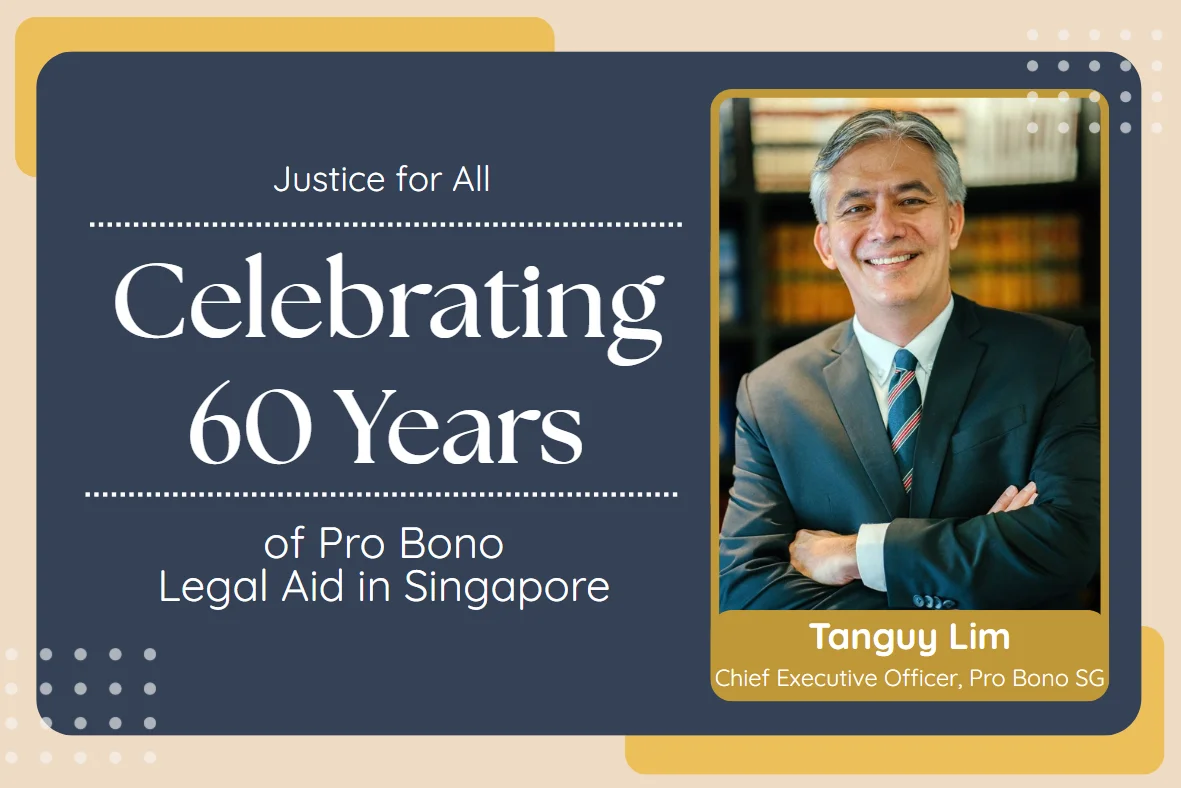
Justice for All: Celebrating 60 Years of Pro Bono Legal Aid in Singapore
Early Years and the Birth of Legal Aid
When Singapore marked its early years of independence, pro bono work was largely the province of a few dedicated lawyers, driven by conviction rather than formal structures. Opportunities were limited: criminal, family, and community law dominated, and legal clinics, though present, were loosely organised.
Access to justice, however, has long been a cornerstone of Singapore’s legal system. The government recognised the urgent need for a structured legal aid scheme to provide legal assistance to those unable to afford it – leading to the passage of the Legal Aid and Advice Ordinance and the establishment of the Legal Aid Bureau (LAB) in 1958. Over the decades, the LAB evolved under the 1995 Legal Aid and Advice Act, focusing exclusively on civil cases and directing limited state resources where they could make the most impact.
The Rise of Pro Bono SG
Building on this foundation, Singapore’s modern pro bono movement took shape in 2007 with the launch of the Pro Bono Services Office (PBSO), following a landmark Law Society review. Co-authored by Jimmy Yim SC, the report called on all practising lawyers to uphold access to justice by contributing pro bono hours—recommending an aspirational target of 25 hours per lawyer annually and creating a “bank of hours” to channel resources where most needed.
The PBSO soon became a central hub for coordinating pro bono efforts. In 2022, it was renamed Pro Bono SG (PBSG) to reflect a nationwide commitment to doing good. That same year, Yim helped establish a community-based free legal office at Hougang’s Tian De Temple, bringing legal support closer to residents who faced mobility or technology barriers.
Since then, PBSG has supported nearly 180,000 beneficiaries through legal awareness, advice, and advocacy.
“With PBSG’s establishment, we built a robust framework to support lawyers across all seniority levels and specialisations,” says Tanguy Lim, Chief Executive Officer of PBSG. Administrative hurdles were removed so lawyers could focus on what mattered: helping clients. At the same time, managing partners of large law firms were brought on board, signalling that pro bono was not a side quest but a professional responsibility.
A cornerstone of PBSG’s work is its island-wide network of legal clinics, run in partnership with various community organisations, from Community Development Councils (CDCs) to religious institutions such as Angullia Mosque for migrant worker clinics. These clinics act as first responders, helping individuals determine whether their issues are legal in nature and guiding them on the next steps. Volunteers receive case details and questions in advance, along with comprehensive manuals addressing common legal issues. “Even without practising in a specific area, volunteers can confidently provide accurate guidance, opening doors for many more lawyers to participate,” Lim explains.
Navigating Challenges
Despite its successes, PBSG continues to navigate evolving challenges in Singapore’s pro bono landscape. An ongoing challenge is identifying where lawyers can make the most meaningful impact without overlapping existing legal aid programmes. With community needs constantly shifting, PBSG relies on close collaboration with social service agencies and partners on the ground to understand emerging issues and adapt quickly.
With Singapore on the cusp of becoming a super-aged society, legal issues around end-of-life planning—from Lasting Powers of Attorney (LPA) to wills and care arrangements—will be increasingly significant. These challenges extend beyond seniors themselves, as caregivers must also navigate complex questions of housing, financial management, and family responsibilities. To meet these emerging needs, PBSG is working with social service agencies and eldercare stakeholders to design legal support systems that can scale effectively.
Other challenges include time constraints, as lawyers juggle demanding practices alongside volunteering and the need for expertise beyond the legal profession, such as interpreters, data scientists, and specialists from diverse fields. Sustained financial support will also be essential for PBSG to expand and adapt its services.
Looking Ahead
The future of access to justice cannot rest on lawyers alone. Raising public awareness remains critical. As part of the SG60 campaign, PBSG is inviting the community to contribute – by volunteering skills, spreading the awareness of its work or supporting fundraising initiatives as ambassadors for justice.
“PBSG’s mission is Singapore’s mission, and public contributions help us sustain and expand our services.” says Lim.
Every contribution, big or small, like what Lim says, indeed brings Singapore closer to a vision of justice for all.

